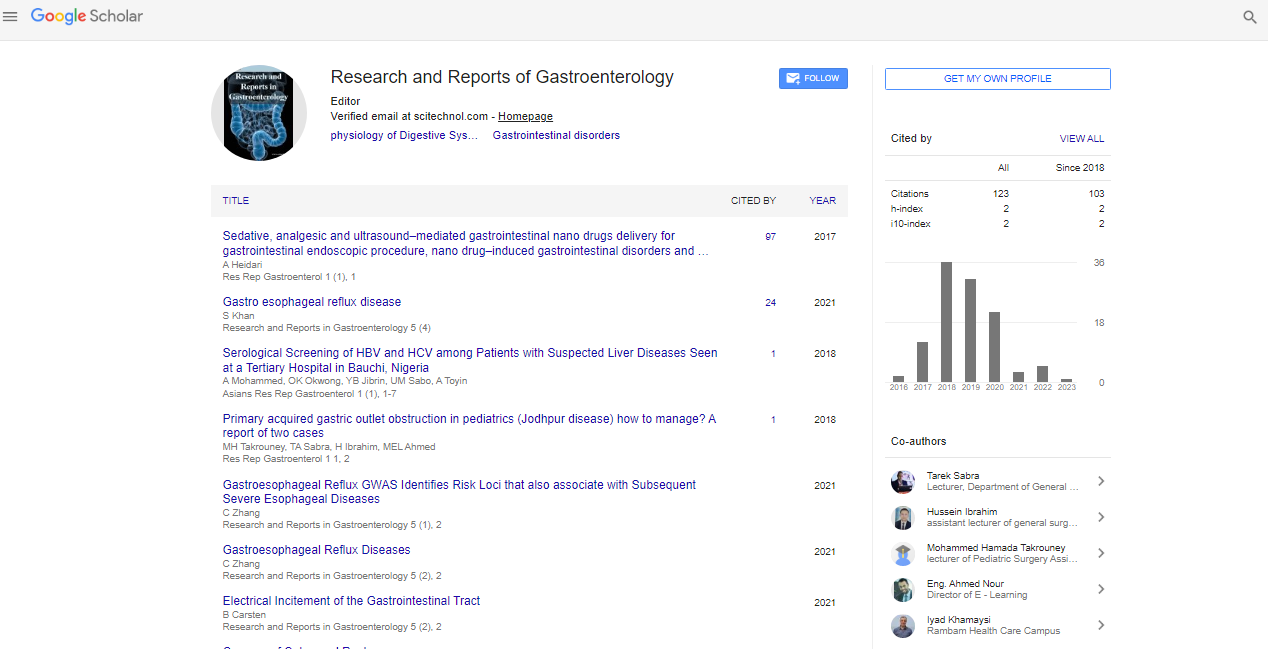Commentary, Res Rep Gastroenterol Vol: 7 Issue: 2
Diagnostic Utility of Non-Invasive Biomarkers in Gastrointestinal Cancers
Kath Sorge*
1Division of Gastroenterology, University of Toronto, Toronto, Canada
*Corresponding Author: Kath Sorge,
Division of Gastroenterology, University of
Toronto, Toronto, Canada
E-mail: sorgekath@gmail.com
Received date: 15 May, 2023, Manuscript No RRG-23-106609;
Editor assigned date: 17 May, 2023, PreQC No RRG-23-106609 (PQ);
Reviewed date: 01 June, 2023, QC No RRG-23-106609;
Revised date: 08 June, 2023, Manuscript No RRG-23-106609 (R);
Published date: 16 June, 2023, DOI: 10.4172/Rrg.1000138
Citation: Sorge K (2023) Diagnostic Utility of Non-Invasive Biomarkers in Gastrointestinal Cancers. Res Rep Gastroenterol 2023, 7:2.
Abstract
Description
Gastrointestinal (GI) cancers, including colorectal, gastric, pancreatic, and esophageal cancers, are a significant global health burden. Early detection plays a major role in improving patient outcomes, as it allows for timely intervention and treatment. Traditional diagnostic methods often involve invasive procedures such as biopsies, which can be uncomfortable for patients and may carry associated risks. The recent advancements in non-invasive biomarkers have shown promise in revolutionizing the diagnosis of GI cancers.
Non-invasive biomarkers
Non-invasive biomarkers are substances or molecules that can be detected in easily accessible body fluids such as blood, urine, and stool. These biomarkers can provide valuable information about the presence, progression, and prognosis of diseases, including gastrointestinal cancers. Non-invasive biomarkers offer several advantages over traditional diagnostic methods, including simplicity, cost-effectiveness, and reduced patient discomfort.
Colorectal cancer
Colorectal cancer is the third most common cancer worldwide. Noninvasive biomarkers such as Fecal Occult Blood Tests (FOBT) and Fecal Immunochemical Tests (FIT) have been widely used for colorectal cancer screening. These tests detect the presence of blood or blood-related proteins in stool samples, indicating the potential presence of colorectal tumors. Additionally, molecular biomarkers like Deoxyribonucleic Acid (DNA) mutations, and methylated DNA markers, detected in stool or blood samples, show promise in improving the sensitivity and specificity of colorectal cancer diagnosis.
Gastric cancer
Gastric cancer is a leading cause of cancer-related deaths globally. Non-invasive biomarkers, particularly serum biomarkers, have been extensively studied for their diagnostic potential in gastric cancer. Tumor markers such as Carcinoembryonic Antigen (CEA), Cancer Antigen 19-9 (CA 19-9), and Carbohydrate Antigen 72-4 (CA 72-4) have been investigated for their ability to detect gastric cancer. Furthermore, emerging research focuses on the use of microRNAs, Circulating Tumor Cells (CTCs), and Circulating Tumor DNA (ctDNA) as potential non-invasive biomarkers for gastric cancer detection and monitoring.
Pancreatic cancer
Pancreatic cancer is often diagnosed at advanced stages, contributing to its high mortality rate. Non-invasive biomarkers offer hope for early detection and improved outcomes. Serum biomarkers such as CA 19-9 and CEA have been used in pancreatic cancer diagnosis, although their sensitivity and specificity are limited. Recent advancements have focused on the potential use of microRNAs, exosomes, and cell-free DNA in blood samples, as well as the detection of pancreatic cancer-associated genetic alterations in stool samples, to improve early detection and monitoring of pancreatic cancer.
Esophageal cancer
Esophageal cancer is a highly aggressive malignancy with a poor prognosis. Non-invasive biomarkers are being explored to aid in the early diagnosis and surveillance of esophageal cancer. Salivary biomarkers, including microRNAs and protein profiles, have shown promise in distinguishing esophageal cancer patients from healthy individuals. Additionally, plasma-based biomarkers, such as circulating cell-free DNA and methylated DNA markers, are being investigated for their potential diagnostic utility in esophageal cancer.
Conclusion
Non-invasive biomarkers have the potential to revolutionize the diagnosis and management of gastrointestinal cancers. By offering a simpler, cost-effective, and less invasive alternative to traditional diagnostic methods, these biomarkers can facilitate early detection, improve patient outcomes, and guide personalized treatment strategies. Although further research and validation are necessary, non-invasive biomarkers show great promise as valuable tools in the fight against gastrointestinal cancers. Continued advancements in this field have the potential to transform clinical practice and contribute to reducing the global burden of these deadly diseases.
 Spanish
Spanish  Chinese
Chinese  Russian
Russian  German
German  French
French  Japanese
Japanese  Portuguese
Portuguese  Hindi
Hindi 